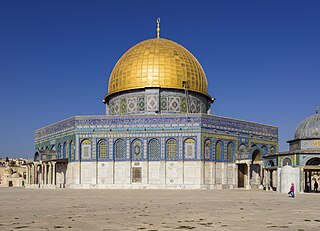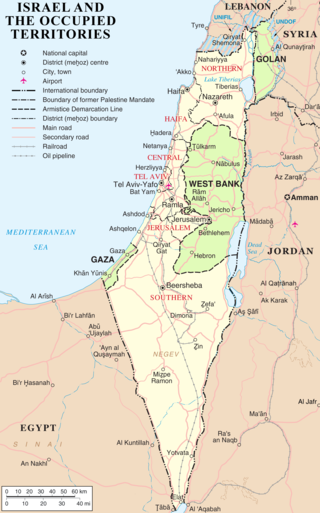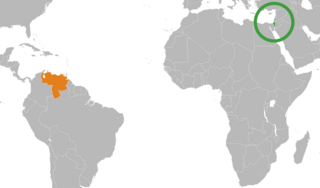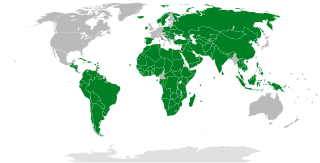
The history of the State of Palestine describes the creation and evolution of the State of Palestine in the West Bank and Gaza Strip.
The Arab League was formed in Cairo on 22 March 1945 with six members: Egypt, Iraq, Transjordan, Lebanon, Saudi Arabia, and Syria. Yemen joined on 5 May 1945. Since its formation the Arab League has promoted the Palestinian Arab cause in the Israeli–Palestinian conflict, including by imposing the Arab League boycott of Israel. The Arab League opposed the United Nations Partition Plan for Palestine in 1947. On 15 May 1948, the then seven Arab League members coordinated an invasion of what was by then the former British Mandate, marking the start of the 1948 Arab–Israeli War.

Israel has occupied the Palestinian territories and the Golan Heights since the Six-Day War of 1967. It previously occupied the Sinai Peninsula and southern Lebanon as well. Prior to Israel's victory in the Six-Day War, occupation of the Palestinian territories was split between Egypt and Jordan, with the former having occupied the Gaza Strip and the latter having annexed the West Bank; the Sinai Peninsula and the Golan Heights were under the sovereignty of Egypt and Syria, respectively. The first conjoined usage of the terms "occupied" and "territories" with regard to Israel was in United Nations Security Council Resolution 242, which was drafted in the aftermath of the Six-Day War and called for: "the establishment of a just and lasting peace in the Middle East" to be achieved by "the application of both the following principles: ... Withdrawal of Israeli armed forces from territories occupied in the recent conflict ... Termination of all claims or states of belligerency and respect for and acknowledgment of the sovereignty, territorial integrity and political independence of every State in the area and their right to live in peace within secure and recognized boundaries free from threats or acts of force."

The status of Jerusalem has been described as "one of the most intractable issues in the Israeli–Palestinian conflict" due to the long-running territorial dispute between Israel and the Palestinians, both of which claim it as their capital city. Part of this issue of sovereignty is tied to concerns over access to holy sites in the Abrahamic religions; the current religious environment in Jerusalem is upheld by the "Status Quo" of the former Ottoman Empire. As the Israeli–Palestinian peace process has primarily navigated the option of a two-state solution, one of the largest points of contention has been East Jerusalem, which was part of the Jordanian-annexed West Bank until the beginning of the Israeli occupation in 1967.

Israeli–Venezuelan relations refer to foreign relations between Israel and Venezuela. Both countries have no formal relations since 2009. Canada serves as Israel's protecting power in Venezuela through its embassy in Caracas, while Spain serves as Venezuela's protecting power in Israel through its embassy in Tel Aviv.

Israel–New Zealand relations are the foreign relations between the State of Israel and New Zealand. While Israel has an embassy in Wellington, New Zealand's embassy in Ankara, Turkey is accredited to Israel. Diplomatic relations between the two countries date back to January 1949. New Zealand has exported a mixture of agricultural and manufactured goods to Israel. In return, Israel has exported a range of manufactured goods to New Zealand. Bilateral relations between the two countries have been complicated by issues such as the 2004 Israel–New Zealand passport scandal, United Nations Security Council Resolution 2334, and the Israel-Palestine conflict.

The Arab–Israeli conflict is the phenomenon involving political tension, military conflicts, and other disputes between various Arab countries and Israel, which escalated during the 20th century. The roots of the Arab–Israeli conflict have been attributed to the support by Arab League member countries for the Palestinians, a fellow League member, in the ongoing Israeli–Palestinian conflict; this in turn has been attributed to the simultaneous rise of Zionism and Arab nationalism towards the end of the 19th century, though the two national movements had not clashed until the 1920s.

The modern borders of Israel exist as the result both of past wars and of diplomatic agreements between the State of Israel and its neighbours, as well as an effect of the agreements among colonial powers ruling in the region before Israel's creation. Only two of Israel's five total potential land borders are internationally recognized and uncontested, while the other three remain disputed; the majority of its border disputes are rooted in territorial changes that came about as a result of the 1967 Arab–Israeli War, which saw Israel occupy large swathes of territory from its rivals. Israel's two formally recognized and confirmed borders exist with Egypt and Jordan since the 1979 Egypt–Israel peace treaty and the 1994 Israel–Jordan peace treaty, while its borders with Syria, Lebanon and the Palestinian territories remain internationally defined as contested.

Ireland–Israel relations are foreign relations between Ireland and Israel.

Relations between Israel and the Czech Republic, and its predecessor state Czechoslovakia, have varied widely over time.

Israel–Singapore relations, also referred to as Israeli–Singaporean relations, refers to the bilateral relations between the State of Israel and the Republic of Singapore. Relations between the two countries have been extremely cordial and friendly for more than half a century, which are influenced by their similar geopolitical state of affairs, being relatively small states surrounded by larger neighbors.

Israel–Jordan relations are the diplomatic, economic and cultural relations between Israel and Jordan. The two countries share a land border, with three border crossings: Yitzhak Rabin/Wadi Araba Crossing, Jordan River Crossing and the Allenby/King Hussein Bridge Crossing, that connects the West Bank with Jordan. The relationship between the two countries is regulated by the Israel–Jordan peace treaty in 1994, which formally ended the state of war that had existed between the two countries since the establishment of the State of Israel in 1948, and also established diplomatic relations, besides other matters. Relations between the countries get strained from time to time, usually over tensions at the Al-Aqsa mosque. On 8 October 2020, Israel and Jordan reached an agreement to allow flights to cross over both countries’ airspace.

Brazil–Palestine relations are the current and historical bilateral relations between Brazil and Palestine. On 5 December 2010, Brazil officially recognized the State of Palestine including all of the West Bank and the Gaza Strip. In 2015, the Embassy of the State of Palestine to Brazil was opened in Brazil's capital, Brasília, and the Brazilian government received an area in Ramallah for installing its diplomatic mission to Palestine.

International relations between Argentina and Israel, have existed for decades. Both countries established diplomatic relations on 31 May 1949.

The State of Palestine has been accepted as an observer state of the United Nations General Assembly in November 2012. As of 2 June 2023, 139 of the 193 United Nations (UN) member states have recognized the State of Palestine. In contrast Israel is recognized by 165.

Israel–Nauru relations are diplomatic and other relations between Israel and Nauru. Israel has a non-resident ambassador in Jerusalem and honorary consulate (Yaren), Nauru has an honorary consulate.

On December 6, 2017, the United States of America officially recognized Jerusalem as the capital city of the State of Israel. American president Donald Trump, who signed the presidential proclamation, also ordered the relocation of the American diplomatic mission to Jerusalem from Tel Aviv, constituting what is now the Embassy of the United States in Jerusalem, which was established on the grounds of the former Consulate General of the United States in Jerusalem. Israeli prime minister Benjamin Netanyahu welcomed the decision and praised the announcement by the Trump administration. On December 8, U.S. Secretary of State Rex Tillerson clarified that Trump's statement "did not indicate any final status for Jerusalem" and "was very clear that the final status, including the borders, would be left to the two parties to negotiate and decide" in reference to the recognition's impact on the Israeli–Palestinian peace process.

United Nations General Assembly Resolution ES‑10/19 is an emergency session resolution declaring the status of Jerusalem as Israel's capital as "null and void". It was adopted by the 37th Plenary meeting of the tenth emergency special session of the United Nations General Assembly during the tenure of the seventy-second session of the United Nations General Assembly on 21 December 2017. The resolution was drafted by Yemen and Turkey. Though strongly contested by the United States, it passed by 128 votes to 9 against with 21 absentees and 35 abstentions.

The Trump peace plan, officially titled "Peace to Prosperity: A Vision to Improve the Lives of the Palestinian and Israeli People", was a proposal by the Trump administration to resolve the Israeli–Palestinian conflict. President Donald Trump formally unveiled the plan in a White House press conference alongside Israeli Prime Minister Benjamin Netanyahu on 28 January 2020. The plan had been delayed by two years and previously rejected by the Palestinians, who were not invited to the meeting.

Australia–Palestine relations refer to foreign relations between Australia and the State of Palestine. Australia does not recognise the State of Palestine but does support a two state solution.






















